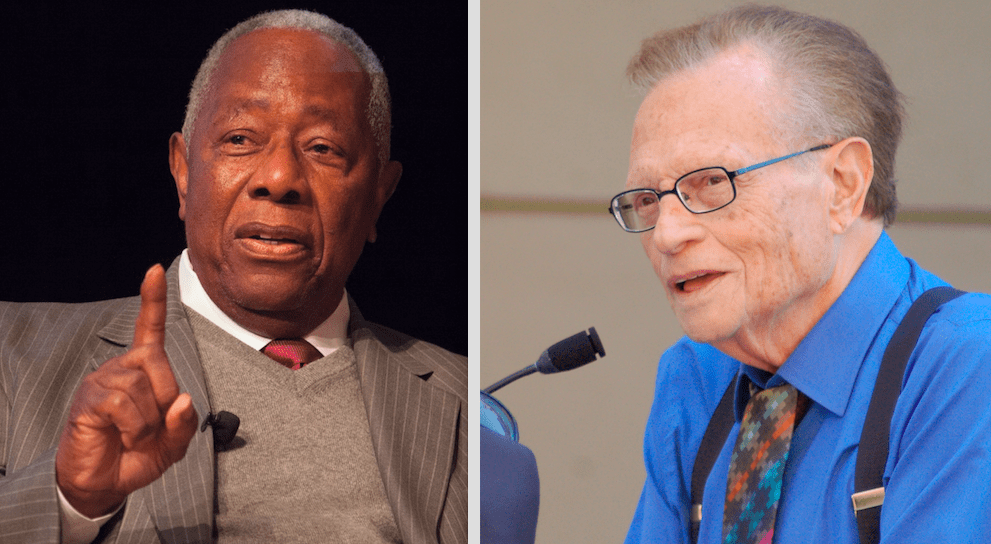Hank and Larry (and Ted)
By • January 25, 2021 0 1723

On Friday, Jan. 22, @TedTurnerIII tweeted, above a photo of Hank Aaron in uniform against the sky: “Rest in peace, my friend. We will miss you dearly.” The next day’s tweet, with a photo of Larry King, suspendered and intent, read: “The world has lost a true broadcasting legend.”
At 82, Ted Turner — who hired Aaron as one of the first Blacks in Major League Baseball’s executive ranks in 1977, during his 20-year ownership of the Atlanta Braves, and who tapped King in 1985 to host an interview show on his five-year-old cable network, CNN — is just a few years younger than these two world-famous Americans, who died a day apart.
Aaron and King were born around the same time, too: Aaron, who preferred his given name, Henry, to Hank, on Feb. 5, 1934, in Mobile, Alabama, and King, as Lawrence Harvey Zeiger, on Nov. 19, 1933, in Brooklyn. But apart from their connection to Turner and their involvement in professional sports (King was a radio commentator on Miami Dolphins games in the early 1970s), they couldn’t have been more different.
Other than changing his name at a station manager’s suggestion so he wouldn’t sound too Jewish, King didn’t worry much about his ancestry holding him back or inviting abuse. Aaron, in contrast, grew up in the segregated South, was verbally abused while playing for the Jacksonville Braves in the South Atlantic League and, with increasing intensity as he approached — then, in 1974, tied and passed — Babe Ruth’s home run record, was the recipient of a huge volume of hate mail, including death threats.
Aaron modeled his steady behavior on his idol, Jackie Robinson, the controlled, somewhat distant hero of baseball’s integration. He was married to his first wife, with whom he had five children, for 18 years, and to his second wife, with whom he had a sixth child, for nearly 50. King had a gambler’s personality. He racked up debts, filed for bankruptcy and was accused of grand larceny by his former friend, convicted financier Louis Wolfson (and the less said about his eight marriages, the better).
Also unlike Aaron, King spent a good part of his career in the Washington, D.C., area. His late-night guest-and-call-in radio show, which ran from 1978 to 1994, was nationally broadcast from Mutual’s studio in Crystal City, Virginia. Over its 25-year run, his CNN program, “Larry King Live,” also had a Washington flavor at times. In addition to countless authors, actors and celebrities of every stripe, King interviewed many national and world leaders. Ross Perot’s announcement of his presidential candidacy on the show in 1992 opened the floodgates for political candidates to appear on non-news programs.
In 1991, Aaron made an appearance — remotely in more ways than one — on “Larry King Live” to talk about his book, “I Had a Hammer.” Though the two were acquainted, and the ever-garrulous King made his usual attempts to get his guests to tell tales out of school, it wasn’t the most captivating television. Aaron took the opportunity to make clear that he had been a strong if mostly behind-the-scenes supporter of the civil rights movement, and that he felt the country still had a long way to go (important points, if not particularly revealing).
One thing that Aaron and King had in common — though it wasn’t evident in the polite conversation between two well-dressed older men that took place on King’s show — was that the two built legendary careers on the talents and dreams of their youth. And, unlike their billionaire friend and patron Ted, without family money or education past high school.
The American Dream, their lives remind us, takes many forms.

